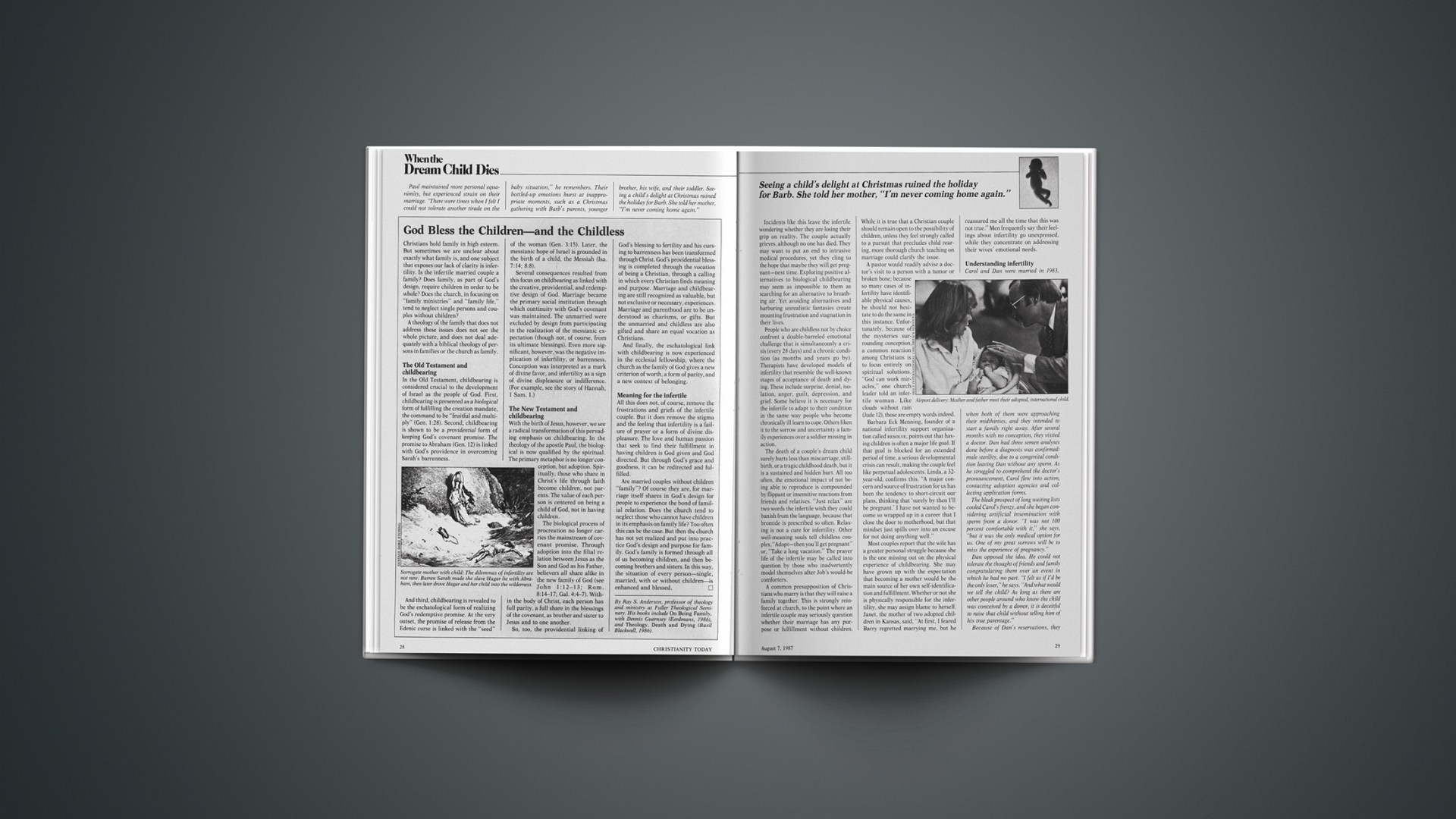Christians hold family in high esteem. But sometimes we are unclear about exactly what family is, and one subject that exposes our lack of clarity is infertility. Is the infertile married couple a family? Does family, as part of God’s design, require children in order to be whole? Does the church, in focusing on “family ministries” and “family life,” tend to neglect single persons and couples without children?
A theology of the family that does not address these issues does not see the whole picture, and does not deal adequately with a biblical theology of persons in families or the church as family.
The Old Testament and childbearing
In the Old Testament, childbearing is considered crucial to the development of Israel as the people of God. First, childbearing is presented as a biological form of fulfilling the creation mandate, the command to be “fruitful and multiply” (Gen. 1:28). Second, childbearing is shown to be a providential form of keeping God’s covenant promise. The promise to Abraham (Gen. 12) is linked with God’s providence in overcoming Sarah’s barrenness.
And third, childbearing is revealed to be the eschatological form of realizing God’s redemptive promise. At the very outset, the promise of release from the Edenic curse is linked with the “seed” of the woman (Gen. 3:15). Later, the messianic hope of Israel is grounded in the birth of a child, the Messiah (Isa. 7:14; 8:8).
Several consequences resulted from this focus on childbearing as linked with the creative, providential, and redemptive design of God. Marriage became the primary social institution through which continuity with God’s covenant was maintained. The unmarried were excluded by design from participating in the realization of the messianic expectation (though not, of course, from its ultimate blessings). Even more significant, however, was the negative implication of infertility, or barrenness. Conception was interpreted as a mark of divine favor, and infertility as a sign of divine displeasure or indifference. (For example, see the story of Hannah, 1 Sam. 1.)
The New Testament and childbearing
With the birth of Jesus, however, we see a radical transformation of this pervading emphasis on childbearing. In the theology of the apostle Paul, the biological is now qualified by the spiritual. The primary metaphor is no longer conception, but adoption. Spiritually, those who share in Christ’s life through faith become children, not parents. The value of each person is centered on being a child of God, not in having children.
The biological process of procreation no longer carries the mainstream of covenant promise. Through adoption into the filial relation between Jesus as the Son and God as his Father, believers all share alike in the new family of God (see John 1:12–13; Rom. 8:14–17; Gal. 4:4–7). Within the body of Christ, each person has full parity, a full share in the blessings of the covenant, as brother and sister to Jesus and to one another.
So, too, the providential linking of God’s blessing to fertility and his cursing to barrenness has been transformed through Christ. God’s providential blessing is completed through the vocation of being a Christian, through a calling in which every Christian finds meaning and purpose. Marriage and childbearing are still recognized as valuable, but not exclusive or necessary, experiences. Marriage and parenthood are to be understood as charisms, or gifts. But the unmarried and childless are also gifted and share an equal vocation as Christians.
And finally, the eschatological link with childbearing is now experienced in the ecclesial fellowship, where the church as the family of God gives a new criterion of worth, a form of parity, and a new context of belonging.
Meaning for the infertile
All this does not, of course, remove the frustrations and griefs of the infertile couple. But it does remove the stigma and the feeling that infertility is a failure of prayer or a form of divine displeasure. The love and human passion that seek to find their fulfillment in having children is God given and God directed. But through God’s grace and goodness, it can be redirected and fulfilled.
Are married couples without children “family”? Of course they are, for marriage itself shares in God’s design for people to experience the bond of familial relation. Does the church tend to neglect those who cannot have children in its emphasis on family life? Too often this can be the case. But then the church has not yet realized and put into practice God’s design and purpose for family. God’s family is formed through all of us becoming children, and then becoming brothers and sisters. In this way, the situation of every person—single, married, with or without children—is enhanced and blessed.
By Ray S. Anderson, professor of theology and ministry at Fuller Theological Seminary. His books include On Being Family, with Dennis Guernsey (Eerdmans, 1986), and Theology, Death and Dying (Basil Blackwell, 1986).










